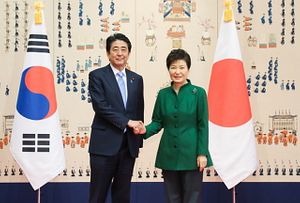In 2015 a bilateral agreement negotiated by the foreign ministries and leaders of Japan and South Korea resolved to “finally and irreversibly” bring the longstanding comfort women issue to an end. Met with widespread international acclaim by nations including the United States, the United Kingdom, and Germany, the agreement had three key pillars. First, Japan would sincerely apologize for its wartime conduct relating to the comfort women. Second, Japan would pay 1 billion yen ($8.9 million) to a foundation to be established by South Korea to benefit former comfort women. And third, South Korea would strive to resolve the issue of a comfort women statue erected in front of the Embassy of Japan in Seoul.
While Japan has fulfilled its obligations under the first two pillars, with the Japanese Prime Minister apologizing and the promised Japanese funds having been paid, South Korea has done little or nothing to address Japan’s concerns in terms of the embassy statue in Seoul. Furthermore, a year after the signing of the agreement, an additional statue was installed in front of the Consulate of Japan in Busan. Both statues are now the focus of regular anti-Japanese demonstrations and, thereby, constitute clear violations of Article 22 the 1961 Vienna Convention, which obligates a host country to protect a foreign diplomatic mission against any “disturbance of the peace” or “impairment of its dignity.”
Shortly after South Korean President Moon Jae-in took office, he cast doubts on the 2015 agreement as representing something that “the people cannot emotionally accept.” And, on December 27 of this year, Moon further criticized the accord as a “political agreement that excludes victims and the public” that “cannot solve the comfort women issue.” Moon further contends that the accord violates general principles in international society.
Japan responded to Moon’s pronouncements through normal diplomatic channels, stating that any attempt to change the deal would be unacceptable. The 2015 agreement was a calculated risk both for Prime Minister Shinzo Abe and President Park Geun-hye, the respective leaders of Japan and South Korea at that time. Both Abe and Park took a leap of faith in their belief that they could finally deliver closure and unburden future generations from this issue and its attendant bitterness. Such commitment, under Moon, is no longer apparent.
Moon’s assertions represent not just an appeal to populism, but a nebulous reinterpretation of diplomatic norms in an attempt to portray the agreement as having no moral standing. That Moon believes the 2015 agreement to be “flawed” does not make it void. Elected leaders of representative democracies, including Moon’s predecessor, are empowered to negotiate international agreements, which their successors are not subsequently entitled to nullify on a populist whim. Moon’s argument, that the agreement is invalid because it is insufficiently victim-oriented and unpopular, while appearing humanitarian and ostensibly credible, is unsound. Considering his logic in extremis, do the victims of the Hiroshima and Nagasaki atomic bombings need to be given the right to veto the 1968 Non-Proliferation Treaty in order for it to be considered valid? And would an NPT signatory state be justified in decrying the NPT simply because it was unpopular? To condone states walking away from difficult agreements made in good faith legitimizes a practice of reneging on commitments whenever it proves politically expedient to do so, with wider and more serious implications in terms of maintaining the international order.
Moon has raised the possibility of revisiting the 2015 agreement, without specifics, perhaps sensing a “win-win” scenario. Either Japan will offer further concessions, in which case Moon will portray himself as a strong leader, or Japan will refuse renegotiation, and he will still enjoy popularity on the back of angst toward both Japan and former President Park.
More fundamentally, it is unclear what Moon wants to achieve. Does he really want a new bilateral agreement, or does he perceive the potential returns on political capital invested in Japan-bashing to be better than those achievable from a permanent resolution of the comfort women issue? And, even if Moon is sincere, would he be able to deliver popular opinion behind a new deal, making such an agreement final through deed and not just in words?
Japan’s best or, perhaps, least-worst, option is to do nothing. Renegotiation, in any case, appears infeasible given the danger that a further deal would simply be reversed again on the grounds of popular dissatisfaction or through change of administration.
Without further agreement, the comfort women issue will likely continue to be a diplomatic irritation, notwithstanding the normalization envisaged in both the 1965 Treaty on Basic Relations and the 2015 agreement. For Japan, however, it would be better to live with this unsatisfactory status quo. Renegotiation efforts, no matter how well-intentioned, would undermine the agreement of 2015, with no guarantee of success and much risk of failure. Attempting a further accord to resolve issues supposedly addressed and concluded in 2015 and, arguably, five decades prior, has no practical merit.
Yukari Easton is a researcher and an ACE-Nikaido Fellow at the East Asian Studies Center at University of Southern California.

































